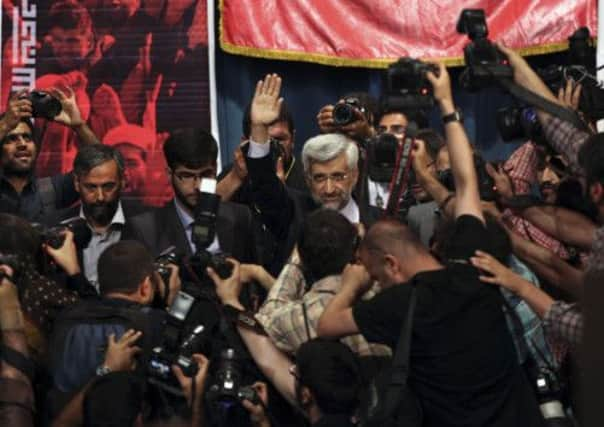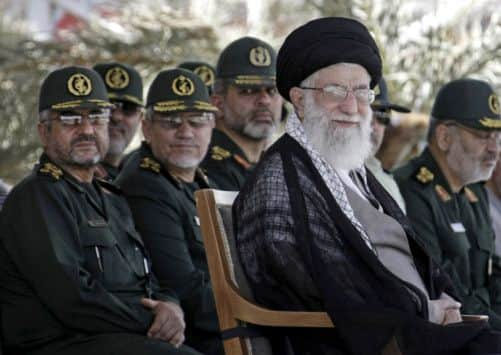Iran: Election frontrunner vows to ‘resist’ West


He told around 3,000 supporters at his first campaign rally: ““The more unyielding we are, the less greedy the enemy will be.
And, referring to Israel, he declared, “we are seeking to dry up the roots of the Zionist regime”.
Advertisement
Hide AdAdvertisement
Hide AdMr Jalili echoed the man he hopes to replace: Mahmoud Ahmadinejad, who must stand down after eight stormy years during which he alienated Iran’s ruling clerics and antagonised the West.


Mr Jalili, 47, however, is a loyal acolyte of supreme leader Ayatollah Ali Khamenei. Indeed, all eight candidates – winnowed from nearly 700 who registered – are allies of the ayatollah.
No-one who might have challenged his authority was allowed to stand, including the seasoned former president Akbar Hashemi Rafsanjani.
Instead, the narrow slate of approved candidates includes a politician whose daughter is married to one of the ayatollah’s sons, one of his senior foreign policy advisers, and a former police chief he appointed.
To western eyes, Iran’s presidential race may now seem merely to be a contest between “yes men”. Iran’s electorate, although embittered and disillusioned, is more discerning.
Many see significant differences between the candidates that could have an impact on their daily lives.
Sir Richard Dalton, Britain’s ambassador to Iran from 2002 to 2006, agrees.
“All are loyal to the system, but in terms of personalities, background and experience, there are distinctions and differences between the candidates.”
Advertisement
Hide AdAdvertisement
Hide AdIran’s presidents have a big say in running the economy – the issue of main concern to Iranian voters – and indirectly can influence nuclear and foreign policy, which are the purview of the supreme leader. Mr Jalili, by far the most hardline of the eight contenders, is emerging as the front-runner.
Farideh Farhi, an Iran expert at the University of Hawaii, believes Mr Jalili’s popularity “would suggest the conservative establishment has priorities other than dealing with Iran’s ailing economy – a prime concern for voters – which is in dire need of better management”. Mr Jalili, she warned, “lacks experience in this field”.
Mr Jalili, however, has pledged to use his experience in nuclear talks with six world powers, including America, to pursue the same policy of uncompromising “resistance” to western demands.
“The Islamic Republic has created a capacity which enables it to challenge the big powers,” he boasted on state television this week.
By contrast, another candidate, Hassan Rowhani, could change the tone if not the substance of Iran’s nuclear diplomacy if elected. A 65-year-old cleric, he is the most prominent moderate in the election, a pragmatic centrist close to both Mr Rafsanjani and the supreme leader.
As Iran’s chief nuclear negotiator 2003-05, Mr Rowhani oversaw an agreement with European powers to briefly suspend Iran’s fledgling uranium-enrichment activities. He is now the most open of the eight candidates to talks with the US, insisting he would base Iran’s foreign policy on engagement, even of “enemies”.
He has fended off accusations by Mr Jalili and other hardliners that he was too soft in nuclear negotiations a decade ago.
In state TV interview, he insisted that under his stewardship Iran was able to continue important nuclear work while he defused the threat of a US military attack. Nor, during his tenure, did Iran provoke the draconian sanctions that are now crippling its economy, he argued.
Advertisement
Hide AdAdvertisement
Hide AdMr Rowhani, who is fluent in English, Arabic, German, Russian and French, stands a chance if Mr Rafsanjani and popular former reformist president, Mohammad Khatamiendorse him – as seems likely.
But Mr Khamenei’s world view is more in tune with that of Mr Jalili’s, which was forged on the front lines of Iran’s war with Iraq in the 1980s where he lost his lower right leg. At university, Mr Jalili wrote his doctoral dissertation on the foreign policy of the Prophet Mohammed.
His main competitor is likely to be a fellow conservative and war veteran, Mohammad Baqer Qalibaf, 52, a charismatic former national police chief and mayor of Tehran, a city of 12 million.